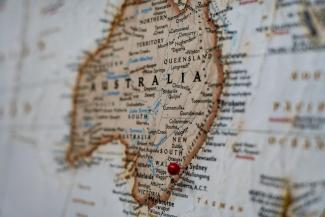
Joey Csunyo on Unsplash
Australia’s Critical Minerals: Crucial for the Push Away from China
Australia has one of the highest natural resource values in the world, with around $20 trillion between resources such as coal, timber, copper, iron ore, uranium, and gold. Among the minerals that are either directly mined or produced as a byproduct of mining is a group known as critical minerals, of which there are 50. Australia is the top miner of lithium, third top miner of cobalt, and fourth top miner of rare earth metals, a subset of 17 critical minerals. Two other critical minerals are the metal gallium and metalloid germanium, both of which, on July 3rd, China said it would limit the exports of moving forward (Nguyen). This announcement has stoked the flames of an already well considered concern, that of overly relying upon China. Nations across the world, and certainly in Asia and the Pacific, are understandably creating long term strategies to help mitigate this risk. While decoupling from China is not likely for any country, some nations have the potential to benefit more than others from the apparent consensus that everyone must “de-risk” by becoming less dependent on the Chinese and closer with their allies. As it stands, China is able to assert dominance over trade partners by threatening to withhold minerals. In 2022, the Chinese even threatened to withhold minerals from Lockheed Martin and Raytheon Technologies, two of the largest defense contractors in the world, showing how the uncertainty of dealings with China can go beyond the Pacific (Pao).
One of the nations with the most to gain from the movement away from Chinese dependency is Australia. Already a powerhouse of mining, Australia currently lacks the infrastructure necessary to refine and process minerals with efficiency, and, in fact, the Aussies ship most of their minerals to none other than China for processing. While Australia may be the world’s top lithium miner, China processes more lithium than any other country, around 60% of the world’s supply (Frangoul). This may not be ideal, but because of their abundance of resources and some of the best miners in the world, the Aussies remain in a strong position to become a superpower of not just mining, but also of processing and of batteries, giving them the potential of shaking up the world order. To reach the point where they are taken seriously as processors of minerals, much investment is needed. The Australian government set aside A$2 billion previously (mainly for a mineral refinery) and have set aside another A$500 million this year for further development. The plan is to be a significant producer of processed critical minerals by 2030, but that is much easier said than done (Burton).
The path to becoming a processing giant will not be cheap, and well more than the previously allocated A$2.5 billion must be contributed. It has taken decades for China to position themselves at the top of the mining and processing podium and they have had distinct advantages that Australia will not have. China has cheap labor, with many workers being paid far below anything that is considered reasonable, or even livable in the West. Australia has certain laws in place to help residents live a prosperous life, but this also means they cannot take the same approach that China has. Similarly, China has been able to use its lax environmental standards to its advantage, whereas Australia, concurrent to the plan of being a significant processor of critical minerals, is on a mission to achieve a set of climate goals by 2030 under the Paris agreement (“Climate Change”). The nature of rare earth metals is that they are actually plentiful but spread rather thin. This means that a great deal of earth must be dug up, displaced, and processed in order to gather these minerals, creating a large environmental hurdle, one that China has largely been able to circumvent, but that Australia will not be able to ignore. The only thing Australia can do to surmount these challenges will be, of course, to spend money.
Fortunately for Australia, other countries around the world can help. The Inflation Reduction Act in the United States is just the beginning as far as the implementation of ally-shoring policies in the West. Following Covid-19 and rising geopolitical tensions, the USA, as well as many other countries, is looking to become more independent where it can and is looking to close allies it can count on in tight situations for areas where it is unable to self-sustain. Countries such as South Korea, Taiwan, and India, all find themselves in quite a precarious position, stuck in the middle between China and the USA, albeit for different reasons. All three will be looking to step up their own production of critical minerals while also setting up strategic partnerships with other countries, likely including Australia. The Australians are also currently working with Japan, trying to secure investment that could help both achieve further autonomy (Smith).
Ultimately, the goal is to break up the Chinese monopoly on the critical minerals trade via growth of a global critical minerals market. Although it may sound plausible, the likelihood of it working is yet unknown. Countries from every corner of Earth will have to work together during a period where most countries have pulled away from one another. When it comes down to it, Australia will play a major role and will be a cornerstone of the meticulous planning that the rest of the world must spend the coming years doing if they wish to mitigate the China risk.
The iSectors® Inflation Protection Allocation includes REMX, the VanEck Rare Earth/Strategic Metals ETF. Visit iSectors.com for more commentary or for information on how to invest with us.
Works Cited
Burton, Melanie. “Australia Taps Global Partners in Landmark Critical Minerals Strategy” Reuters, Reuters, 20 June 2023, https://www.reuters.com/markets/commodities/australia-taps-global-partners-landmark-critical-minerals-strategy-2023-06-19/.
“Climate Change.” Department of Foreign Affairs and Trade, Australian Government, https://www.dfat.gov.au/international-relations/themes/climate-change/international-cooperation-on-climate-change Accessed 18 July 2023.
Frangoul, Anmar. “China Played a Great Game on Lithium and We’ve Been Slow to React: CEO.” CNBC, CNBC, 23 Nov. 2022, https://www.cnbc.com/2022/11/23/china-played-a-great-game-on-lithium-and-weve-been-slow-to-react-ceo.html.
Nguyen, Mai. “China’s Rare Earths Dominance in Focus After It Limits Germanium and Gallium Exports” Reuters, Reuters, 5 July 2023, http://www.reuters.com/markets/commodities/chinas-rare-earths-dominance-focus-after-mineral-export-curbs-2023-07-05/#:~:text=China’s%20rare%20earths%20dominance%20in%20focus%20after%20it%20limits%20germanium%20and%20gallium%2 0exports,-By%20Mai%20Nguyen&text=July%205%20(Reuters)%20%2D%20China,to%20protect%20national%20security%20interests.
Pao, Jeff. “China Takes Rare Earth Aim at Raytheon and Lockheed - Asia Times.” Asia Times, Asia Times, 22 Feb. 2022, https://asiatimes.com/2022/02/china-takes-rare-earth-aim-at-raytheon-and-lockheed/.
Smith, Michael. “Critical Minerals: Australia Seeks Japan’s Help in Becoming a ‘Superpower.’” Australian Financial Review, Australian Financial Review, 21 Apr. 2023, https://www.afr.com/world/asia/australia-seeks-japan-s-help-to-be-critical-minerals-superpower-20230421-p5d2b2

